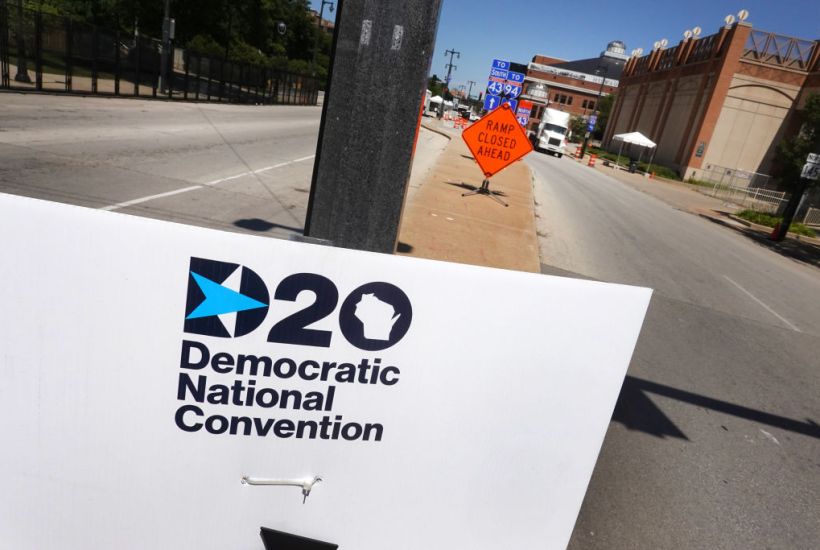The real venue for the Democratic National Convention will not be Milwaukee, but the online platforms that will facilitate and stream it: Zoom, YouTube, Amazon Prime Video, Apple TV and so on. Necessity is the mother of symbolic invention: Democratic politics and Big Tech have been merging for some time. Now COVID has rendered a political party indistinguishable from the Silicon Valley shadow state.
Barack Obama, who will speak to the convention on Wednesday, made a sustained effort to connect Washington DC to Silicon Valley throughout his time as president. One measure of his success is that many former members of his administration have migrated to the tech industry. David Plouffe, a key campaign adviser, went on to work for Uber and the Chan Zuckerberg Initiative. EPA head Lisa Jackson went on to Apple. Attorney General Eric Holder found a berth at Airbnb. Valerie Jarrett, Obama’s close friend and consigliere, is now on the board of Lyft. Many lower-profile staffers have also found positions in technology and venture capital firms.
This web of relationships, plus the industry’s continued largesse to the party, makes it likely that the coziness will continue in the event of a Biden administration. However, recent news makes this ongoing proximity surprising. The election upset of 2016 and its aftermath seemed to put a wedge between the Democrats and Big Tech. Since then, liberals have argued that the industry has too much power and faulted social media platforms for enabling the populist backlash and providing a forum for right-wing extremism. Members of Congress have raked social media CEOs over the coals several times, and Democratic-run cities and states that once welcomed companies like Lyft, Uber and Airbnb are now eager to regulate them.
Silicon Valley now occupies a contradictory political position. Liberals blame it for the successes of their political enemies and promise to curtail its influence. Yet the tech industry also remains one of the last redoubts of the Obama-era dream of technocratic ‘smart government’, which is surely why it attracts so many Obama alumni. Tech also has sufficient influence and reach to carry out some of the technocratic and interventionist agenda that a Democratic administration would pursue.
For instance, Apple and Google have collaborated on a coronavirus test-and-trace program of the sort Democrats would like to implement. And Silicon Valley’s embrace of the Black Lives Matter movement has gone beyond statements of support and donations: tech companies are now regulating speech in new ways as well as limiting law enforcement’s access to their data.
Even more crucial to private technology platforms’ growing quasi-governmental power is that they now furnish the main venues for almost all political discourse. The industry’s executives and engineers have a remarkable ability to set the terms of the debate. Twitter’s recent fact-checking of President Trump offered a pivotal demonstration of the platform’s ability to influence the political system. In contrast, Trump’s retaliatory Executive Order has, at least so far, not added up to much. The reality is that, like most politicians and public figures today, he needs the platform more than it needs him.
The extent of Silicon Valley’s influence doesn’t necessarily mean it will always tip the scales of electoral politics towards its Democratic political allies. Despite the political pressure the industry has been under, the divisive politics of recent years has boosted the profits of the attention economy. Outrage attracts eyeballs, and the Trump era has served up plenty of it. Much as former Obama staffers might like to resurrect a fantasy of placid neoliberal technocracy, their current places of employment also have other incentives.
The conflicted but symbiotic relationship between the two political parties and the Silicon Valley shadow state also generates a mutually beneficial obfuscation of blame. Politicians are happy for tech companies to take some of the heat. Blaming Facebook and Cambridge Analytica for Hillary Clinton’s loss offered useful cover for the post-2016 Democratic party.
The companies may not really mind taking the heat either. They can serve as a lightning rod for public anger, whether from Democrats furious that Trump still has an account, or Republicans angry about Twitter fact-checking him. But the platforms won’t ultimately face serious consequences from such outcry. The fervent supporters of both Democrats and Republicans have nowhere else to go to express their indignation than social media. And Silicon Valley, like Wall Street, might talk left, but it makes sure to donate to both parties.
Geoff Shullenberger is a writer and academic. He blogs at outsidertheory.com.
Got something to add? Join the discussion and comment below.
Get 10 issues for just $10
Subscribe to The Spectator Australia today for the next 10 magazine issues, plus full online access, for just $10.




















Comments
Don't miss out
Join the conversation with other Spectator Australia readers. Subscribe to leave a comment.
SUBSCRIBEAlready a subscriber? Log in